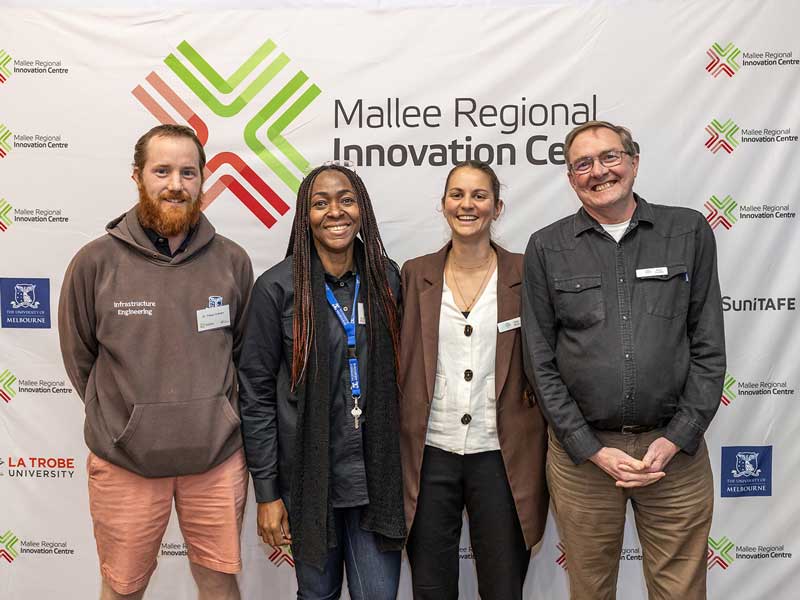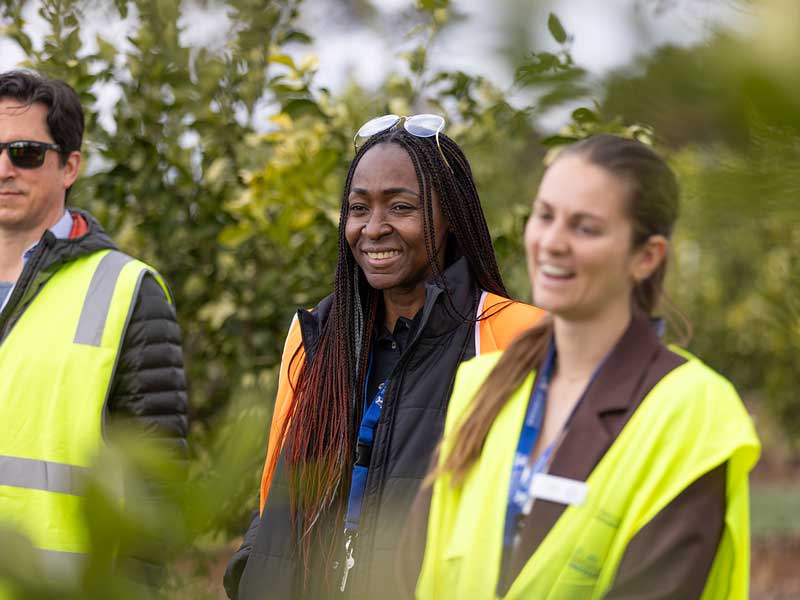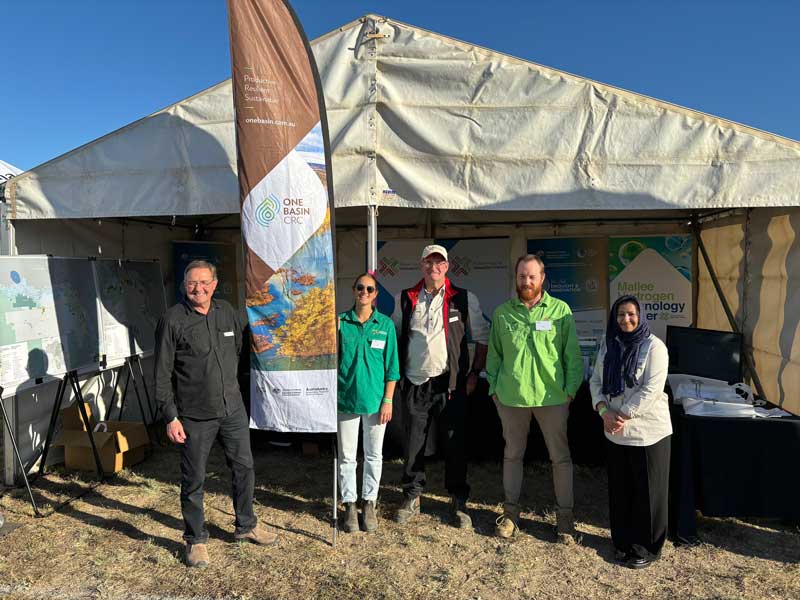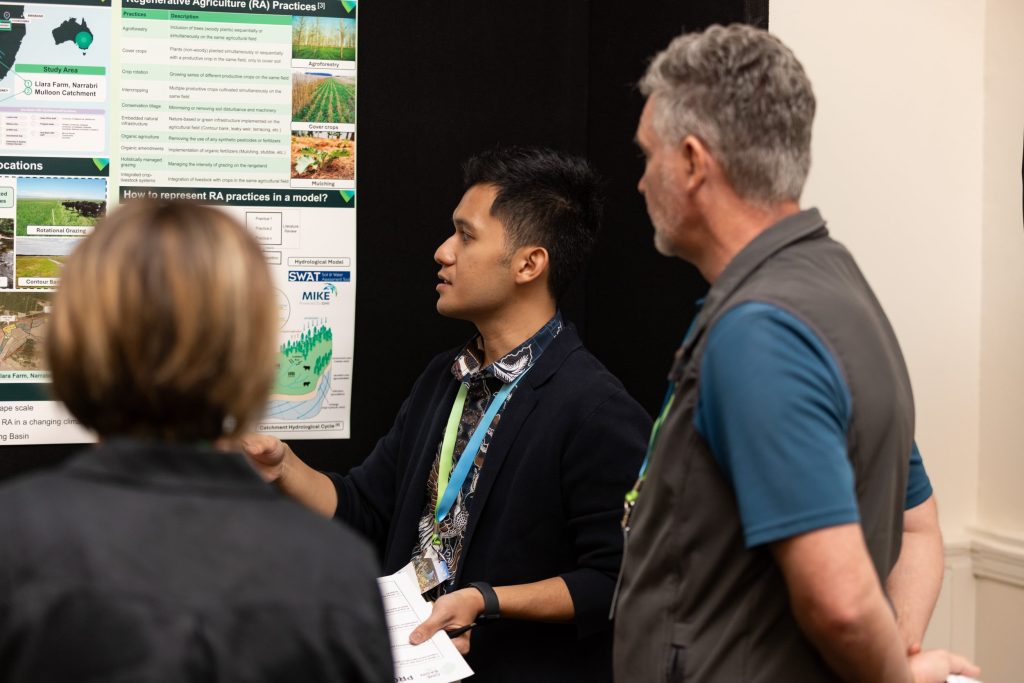A regional ‘dream team’: the PhD scholars who are bringing world-class research to the banks of the Murray-Darling Basin
news
Published 02 Apr 2025
Written by Ralph Johnstone
There’s a lot of lateral thinking going on at the One Basin CRC hub in Mildura these days. Crop scientists, drought monitors, and renewable energy researchers come and go, but there’s a growing group of PhD students – many of them now stationed here permanently – who are breaching once-insurmountable barriers as they take on some of the toughest challenges facing Australia’s largest river catchment.
Camaria Holder and Kelsy Burns, two doctoral candidates from Antigua and Australia, are preparing to help community groups raise their voices in discussions on long-term climate adaptation: Camaria upriver in the vulnerable Goulburn-Broken catchment; Kelsy up the road, at a little lake that’s losing its battle with rising salinity. Shahin Solgi, a charming Iranian scholar, is visiting from Loxton, where his modelling of long-term irrigation demands for different grape varieties holds significant interest for cultivators of the Riverland’s largest crop.

Next door, Tristan Graham, the CRC’s first post-doctoral researcher, is also focused upstream, on the Barmah-Millewa Forest near Echuca, where he’s developing an evaluation tool with river and environmental managers to better understand and inform their decisions on water transfers.
And in February, the team were joined by Lang Zheng, a modest young data scientist from Hong Kong, who believes the predictive power of AI can help Australian irrigators find a more efficient balance between specific crop needs, evaporation rates, renewable energy sources, and variable pump operations.
If One Basin’s first tranche of PhD students appears on paper to be something of a dream team, it’s testament to the tight-knit partnership between the CRC, its six affiliate universities, and a growing number of government and industry partners who share the view that pioneering scholars are critical to the future of this vital river system.
The other part of One Basin’s PhD program that’s reaping dividends is its stipulation that candidates spend most of their three-and-a-half years of study in one of its regional hubs – Griffith and Goondiwindi alongside Loxton and Mildura – where they can directly experience the needs for their research, and rub shoulders with the industries that could benefit from it. Ideally, when their goals align, the CRC is encouraging its partners to sign up students for a part-time internship to address a “real world challenge” facing their operations.
“If you’ve identified a thorny issue that needs resolving, and we have a student with expertise in that field, it makes great sense to have that student embedded in your organisation,” says Wendy Craik, Chair of the CRC Board and a keen advocate of the PhD program. “Some companies may fear they’ll be lumbered with an employee, but if you have someone in your firm who’s becoming an expert in their field, they’ll have an eye for these things, they can see things that need to be changed or done in a more effective way – and they’ll be a lot less expensive than a consultant.”
| Current no. of PhD students with scholarships | 16 |
| Projected no. of PhD students by 2027 | 30 |
| Current or confirmed internships | 5 |
| No. of partnering universities | 6 |
| PhD program by gender | 6 F / 10 M |
| PhD program by nationality | 4 AUS / 12 Int. |
State-of-the-art research
In January, the CRC welcomed its first formal internship when Wiyanda Aflah, a hydrological modeller from Indonesia, joined the Melbourne office of environmental engineering company Water Technology to undertake a literature review of water storage on farmland and floodplains.
Brian Jackson, Water Technology’s group lead for digital solutions, says Wiyanda is already contributing “important research and state-of-the-art understanding” to the company.
“He’s very switched on and is deeply engaged in this foundational work to investigate how remote sensing by satellites can help us model water extents beneath riparian and floodplain tree canopies,” says Brian. “This partnership with One Basin and the University of Sydney is keeping us at the forefront of research in this area – which promises significant potential for environmental flow management and productive water for agronomy.”
In June, Lang will commence the first phase of an internship with SA Water to study their pumping operation practices, and after submitting his thesis, he’ll rejoin the state water provider with a potential opportunity to trial the developed techniques on their systems. Camaria and Kelsy, meanwhile, are negotiating internships related to the Water Futures research project. Kelsy has also secured a part-time job as an extension officer with the Pistachio Growers Association, while Shahin spends a day each week supporting researchers from the South Australian research institute, SARDI – both jobs with clear links to their fields of study.
One Basin’s education and training manager, Dan Pierce, says it’s clear the natural synergies within the CRC ecosystem are beginning to bear fruit among the current crop of PhD students. “Several students are already contributing to CRC research projects and a number of government and industry partners have agreed to host internships and placements,” he says. “This shows great promise for our partnerships, as a growing number of organisations see the rich potential for students to continue their research within the industries – and the regions – that can put it to best use.”
Some industry partners are also beginning to play a role in developing PhD projects to support their work. From April, Adelaide-based innovator Osmoflo will start co-funding a doctoral student in Loxton to study opportunities to replicate the groundwater desalination technology they’ve been trialling at nearby Century Orchards. “This represents a natural progression from a CRC project that’s brought together the brilliant hydrological modellers at the University of Adelaide with a progressive tech company and a farsighted grower to address uncertainties in river water availability,” says Dan Pierce. “A PhD researcher will be the catalyst for taking the partnership further and looking at the potential to use the technology elsewhere in the basin and beyond.”
“Once there are enough scholars based in the regions – and hopefully staying and getting jobs after their PhDs – hopefully we can build a critical mass and find a way to sustain it in the long term,” adds Wendy Craik. “If we can inspire this, I believe the CRC and the community and local industry will all benefit, and the researchers will get a clear steer from industry about what the main issues are – so they become more trusted than your average student or consultant flying in from Melbourne or Sydney.”
“The PhD students are not cloistered in a university, removed from their area of study – they’re right in the heart of it, co-designing with the communities who are living the challenges they’re addressing every day.”
– Jane O’Dywer, CEO, Cooperative Research Australia
Better remuneration, and job prospects
Although the number of annual PhD completions in Australia has more than doubled to exceed 10,000 in recent times, doing a PhD here continues to face many hurdles – as rising living costs outweigh stipends, and a growing number of students elect to go straight into full-time work. One Basin CRC is proactively trying to bring down these hurdles, offering a generous annual stipend of up to $51,300, which with additional operational funding and potential part-time work, provides a comparatively generous package.
Then there’s the clear employment potential of a One Basin PhD, with research topics increasingly aligned with the ecological work and sophisticated technology of public and private companies – rather than the labs and universities that are the traditional milieu of PhD graduates.
Among the many heartening developments over the past year has been a deepening partnership between One Basin CRC and the Murray Darling Basin Authority (MDBA), which as the government agency responsible for coordinating water resource management across the basin, is a critical Tier 1 partner in some of the CRC’s most prominent and ambitious research projects.

Andrew Kremor, head of the integrated river modelling uplift program at MDBA, says the agency has “great faith” in One Basin’s ability to identify suitable PhD students to join the MDBA as interns supporting the four projects it’s currently involved with.
“We’ve made an in-principle commitment to provide five PhD students with six-month internships, working closely with our scientific teams,” says Andrew. “We think this is a fantastic opportunity through which the CRC will provide its students with valuable on-the-job experience, the candidates will enhance their growth and career journeys, and the MDBA will get high-quality students to work on aspects relevant to the agency. Plus some of them may find ongoing employment within the MDBA – which we see as a logical extension of these internships.”
Andrew’s team has been facing up to a national shortage of high-quality hydrological modellers, and he’s currently working with One Basin’s research director Seth Westra to potentially develop a workforce development program, which could broaden the partnership’s capacity-building to other in-demand disciplines – such as water engineering, social science, First Nations research, and agricultural economics.
“Hydrological modelling is facing a huge shortfall,” says Andrew, “and we want to get ahead of the trend and develop a program supporting all four states to attract more talent, train them up, and send them out to industry – and internships and PhDs are an important component of that.”
While relationships with the MDBA and Research & Development Corporations (RDCs) are critical for One Basin to build its skills development capabilities, Seth Westra says an equal challenge is in supporting smaller businesses and community groups to build their own research capabilities.
“At the moment in agriculture most research happens in RDCs or government agencies that employ PhD students, but if you go to community groups or smaller farming businesses, the value of research is often more challenging to communicate and integrate into their business models,” explains Seth. “We recognise the priority placed by our industry partners on building the sector’s capacity for innovation, and our universities are keen to meet this demand – so One Basin CRC really has a critical role to play as a catalyst in this process.”
“Students who base themselves in the regions are giving themselves a serious advantage when it comes to applying for in-demand jobs.”
– Leonie Burrows, Chair, Strategic Advisory Panel, Mallee Regional Innovation Centre
Talking farmers’ language
Talk to many people in the CRC’s blossoming alliance – now numbering 88 partners – and you begin to hear the same advice over and again. About persuading private companies of the importance of research. Talking farmers’ language. Making the impacts of research tangible, and directly relevant to the struggles they face every day.
“The CRC’s PhDs are part of a very exciting program,” says Peter O’Donnell, CEO of Southern Cross Farms and a member of the CRC’s Mildura Regional Advisory Committee. “I don’t think the local community realises the intellectual powerhouse it has working for it.
“But we need to make more efforts to message farmers in language they can understand – tell them ‘you’re going to get more fruit for the same amount of water’. There’s a language for farmers, for industry and tourism – and it’s not the language of academia.”
Leonie Burrows OAM, who chairs the Mildura RAC and MRIC’s Strategic Advisory Panel, and has a lifetime of leadership roles in local government and regional development, agrees. “We have a lot of academics in Australia who are brilliant scientists but often lack the skills to communicate with growers and farmers,” she says. “If you want to talk to people on the land, host a barbecue, talk straight, and focus on outcomes – without couching everything in scientific language. The Mildura hub manager is really across this, helping students connect with industry people on the ground, and MRIC is helping with these connections.
“I hope some of these students will stay, be sponsored by water and environmental businesses, or horticultural peak bodies, so that after the CRC winds up our communities will have a pool of researchers who are based in the regions and keep contributing. These are really great people to have in our community.
“We’re crying out for extra skills in horticulture and water – there are amazing roles available here in engineering, agtech, irrigation management, agronomy, and social science. Students who base themselves in the regions are giving themselves a serious advantage when it comes to applying for these jobs.”
“These students are all great human beings with a lot of experience, and their hearts are in the right places. What they have to contribute to the Murray–Darling Basin is significant both in terms of their research and their commitment to finding solutions that will save water and crops in a climate-afflicted future.”
– Peter Forbes, Mildura Regional Hub Manager, One Basin CRC
A growing family
With five of its first tranche of PhD students based in the regions, a ‘second wave’ is now on the way: one arriving in Griffith at the end of March, and a further two likely to land in Loxton by the end of April. The managers of the four hubs are celebrating these small wins like proud parents – and the comparison is not as far-fetched as it sounds.
PhD students coming to a region usually know no one in the town (in some cases, anywhere in Australia), so their reliance on the hub managers is critical. The CRC has been careful to nurture a team of personable and empathetic managers, who don’t mind working out of hours to help their charges – initially finding them somewhere to live, or buying a car, or paying bills, but also taking them to social events, introducing them to ‘like minds’.
For many of the students, the hub managers become – if not parental – at least trusted friends, helping them find their feet in a new place, and a new culture. When Shahin Solgi arrived in Loxton, hub manager Kym Walton became his touchstone, his sons taking Shahin to the pub and the footy, introducing him to their mates. “Kym is such a special guy,” says Shahin. “I couldn’t have done any of this without him.”

In Mildura, the students are more fortunate, having the ever-attentive manager Peter Forbes, as well as sharing their premises with the Mallee Regional Innovation Centre (MRIC), whose CEO Rebecca Wells and her team have also been a huge support helping them find homes, connect with the local SuniTAFE, and – critically – meet a steady stream of researchers and their Strategic Advisory Panel, which plumbs a rich well of water and horticultural knowledge.
Then there’s the intra-university collaboration between La Trobe and the University of Melbourne, which has made sure all the students have “a proper office setup”, with decent desktops, standing desks, a meeting room for video calls, and loans from the SuniTAFE library. “These are erudite researchers doing vital research,” says Rebecca. “They need the right environment.”
Location, location, location
Being embedded in the right environment makes all the difference, according to Seth Westra. “We understand that doctoral students need to work closely with their academic supervisors,” he says, “but it’s equally important that they’re living and breathing the world of their sponsoring industry – and connecting their research directly to the needs of the local communities. That’s why it’s so important for us that they’re based in the hubs.”
“If you’re based in a region, the relationships you can build with industry stakeholders are more authentic, and regional people respond well to people who care about the issues they care about,” adds Kym Walton. “It’s much more meaningful than a fly-in, fly-out service. Having a deeper understanding about how an industry operates, how particular crops are grown, a real understanding of how things work – that’s fundamental to developing a needs-based solution and building trust between researchers and industry.”
While some universities have higher expectations of PhD students being on campus, some – CSU is an oft-quoted example – are more adept at guiding students remotely. But the CRC’s PhD program seems to be making strides in winning over supervisors across the basin.
Professor Andrew Hall, Shahin Solgi’s supervisor at CSU’s Gulbali Institute and himself a CRC graduate, says he’s delighted with his student’s progress: “The success rate for CRC PhD students is very good, partly because of that extra layer of support. I am confident this will also be the case for the One Basin CRC: support from excellent hub managers, plus the research training the CRC provides on top of the supervisors’ academic support.”
Wiyanda’s supervisor at the University of Sydney, Professor Willem Vervoort, says that while it can be challenging for supervisors to see enough of their students when they’re based in the regions, One Basin’s focus on industry relationships augurs well for its graduates.
“Wiyanda is definitely looking at opportunities to stay in Australia,” says Willem. “Given the investment from the CRC, it’s important to keep these young scientists in our country. But there’s also an opportunity here to provide great leadership in Indonesia – which I believe is a valuable investment for Australia’s future as well.”
“I don’t think the community realises the intellectual powerhouse it has working for it.”
– Peter O’Donnell, CEO, Southern Cross Farms
It is this faith in the future – in a future in Australia – that provides lasting hope from a conversation with these bright and dedicated young researchers.
“My preference would be to stay and join a water utility after graduation, which aligns with my choice of an industry-oriented PhD program,” says Lang. “It feels like home from home here,” says Camaria. “Going to watch Kelsy playing footy, going to the market, the Deepavali festival, the great community at church… there’s enough here to keep me going!”
Perhaps the last word should be reserved for Shahin, who charmed the participants at last year’s One Basin annual meeting with his honest reflections of life as “Loxton’s only Persian”.
“Yes, it’s been challenging,” he says with his trademark honesty. “Many people here are all about footy and cricket and Aussie TV – and I’m not familiar with any of it! But there’s a good reason I’m still here. I’m learning so much… and I know that I’m going to be solving real-world problems – rather than just sitting at a desk for three-and-a-half years and doing literature research in a library.”

Latest news & events
All news & eventsWebinar recording: Working With Country To Heal
Read MoreBuilding capacity for Basin communities to respond to variable water futures
Read MoreDelivering the Commonwealth Environmental Water Holder’s (CEWH) Flow-MER 2025 Annual Forum
Read MoreMurray Darling Association 2025 National Conference: Griffith drives Basin-wide water collaboration
Read More